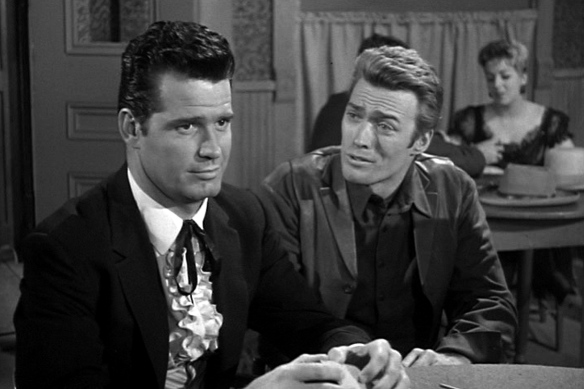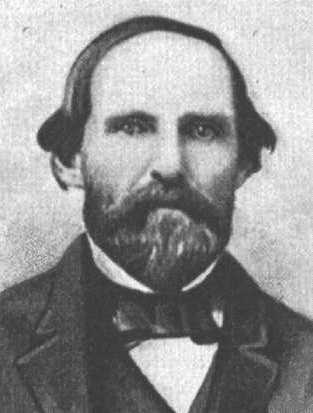A few days ago, I wrote a post wherein I describe people who should not bother reading the Jackson Speed novels.
I thought it was only fair that I also put together a list of those readers who might enjoy the Jackson Speed Memoirs and should therefore be reading them.
If James Garner is your Clint Eastwood

There was a time when I thought that folks who enjoy a good Western would also make good Speed fans. Though most of the Speed novels published so far take place during or around the time of the American Civil War, I’ve always known that eventually the action would shift to a Western setting.
And, as is true with The Outlaw Josey Wales or The Good, The Bad, & The Ugly, the American Civil War and the traditional Western should never be completely separated. Much of the lawlessness of the “Wild West” was a direct result of the Civil War veterans who sought their fortune to the west in a hard and untamed land.
So knowing that one day Jackson Speed would rub elbows with the likes of Billy the Kid and Buckshot Roberts and would ride with the Pinkertons, I always considered the Speed novels to be akin to Westerns.
But I trip on a specific point.
Most Westerns feature as the protagonists brave and hard men who fear nothing. They are fast with a gun and are modern-day knights, chivalrous and noble.
If you love a good Western, there’s a pretty good chance that you want your heroes to be heroic.
Jackson Speed is not that. He’s a coward who stumbles into his adventures, and rather than putting on the white hat and figuring a way to beat the guy in the black hat, Speed is always trying to figure out how to get out of the trouble he’s in. And the color of the hat he wears is always whatever is most convenient for the moment.
I think about some of James Garner’s movies, particularly “Support Your Local Gunfighter.”
Speed is much more the conman with loose morals, more similar to Latigo, than he is Marshal Jed Cooper, the trail-hardened gunslinger.
Jackson Speed is the classic lovable rogue: Rhett Butler, Maverick, Han Solo. If he wasn’t, then how does he manage to always get the girl?
So if James Garner is your Clint Eastwood, and you like your heroes to be a bit on the cowardly side, you’ll probably enjoy the Jackson Speed Memoirs.
If you love history
I am meticulous when it comes to the historical settings of the Jackson Speed books, and I can all but guarantee that even the most avid of armchair historians will learn something in the Jackson Speed books. Some of the books are more heavily footnoted than others – Orange Turnpike, High Tide, and In the Rush all have numerous footnotes to assist in setting the historical context of the books.
In researching the books, I go to as many primary sources as I can. When historical figures make a cameo in the Jackson Speed books, I try very hard to be true and accurate to the character of the man or woman resurrected in the novels.
When describing battles or historical events, I attempt to recreate those as exactly as I can, and I will bend my story to fit the historical record before I will rewrite history to fit my narrative. And when I cannot tell the story I want to tell without altering history, I make a note of it in the footnotes to preserve the historical record.
I do this because I have both a passion and respect for history.
As a result, I also dig deep into my research to find the bizarre and outrageous and forgotten bits of history that you’ll not find in your text books.
Where – other than a Jackson Speed novel – are you going to discover the true and accurate reason why the Georgia volunteers were not taken into battle by Zachary Taylor in the Mexican-American War? Almost nowhere. That true and accurate historical accounting took extensive research, and it’s a moment of history that has almost entirely disappeared from memory.
And that was just a scene from the first book. Similar scenes can be found in any of the Jackson Speed novels.
If you’ve gone looking for Historical Fiction and you’re sick of finding this:

Nothing against Jasmine Ashford (if that’s your real name!). Her books sell significantly better than mine, and she’s got dozens and dozens more 4- and 5-star reviews than I have.
But if you’ve gone looking for historical fiction, and you found this, and you were horrified, I promise that Jackson Speed is not this.
“Shauna had loved Aaron so much; their eyes locking when they met on the street one day. She wasn’t stupid though; she understood completely that a Lord could never marry a peasant, no matter how much they thought they loved each other. She had accepted that from the beginning, just as she accepted everything about him. His smile, his blue eyes, his laugh; his penchant to dream. She knew everything about him as he did her, and she loved him with all of her heart.”
Jackson Speed is nothing at all like this.
You like your humor dry and dark
The Jackson Speed Memoirs are not laugh-out-loud novels, but they are rich in humor. Much of it is a dark humor, as a fair number of the punchlines are centered on some man’s misfortune or death. All of it is a dry humor.
If you like slapstick comedy because you don’t get the joke unless someone smacks you with it, you might not laugh much while reading Jackson Speed. But if a subtle joke that makes you crack a smile is how you roll, you’ll probably enjoy the Jackson Speed novels.
You’re sick of political correctness
I don’t go out of my way to write non-PC novels, but I am certainly not creating characters who have 21st Century sensibilities and putting them into novels about the 1800s.
Some of my characters are bigots. Jackson Speed is a womanizer. The only thing his wife hates more than an abolitionist is William Tecumseh Sherman.
I don’t seek to write offensive books for the sake of being offensive, but if you feel like everyone is too uptight all the time and you think an off-color joke shouldn’t be a crime, you might find that the Jackson Speed novels are just the right amount of offensive.
If you are easily offended, please see my list of people who should not read my books. It does not (but should have) included people who are easily offended.
Nipples and bigamy are cool with you
You think it’s funny that an old man in his 80s and 90s, writing his memoirs, recalls all the women he bedded by the size, color and shape of their nipples.
As noted earlier, Speed is a womanizer. He gets belly-to-belly with as many women as he possibly can in 100,000 words or so, and in writing his memoirs his favorite thing is to reminisce about those women. Often, he recalls them by specific features, in particular their nipples. And he refers to their breasts as “teats.”
The sex is not explicit, but there is a lot of it. Jackson Speed’s arch nemesis throughout each of the novels is the “toothed vagina.” Every escapade and dangerous adventure that Jackson Speed encounters is brought about by his desire to bed some woman, and he is only married to a few of them.
If this isn’t enough to put you off the books, then you are almost surely going to love the Jackson Speed novels.
You love a good adventure
The Jackson Speed novels are full of adventure. Some of them read like a spy novel, and some are military adventures.
Speed’s life span takes him from the Mexican-American War, through the 1849 California Gold Rush, into the War of Northern Aggression, and out to the Wild West. In that time he spends time as a Texas Ranger, a Pinkerton, an officer and a spy for both the Union and the Confederacy, an outlaw, a prospector, an Indian and he rides with the 7th Cavalry. He’s a member of the Knights of the Golden Circle, and he helps fugitive slaves flee the South.
You don’t have to know the history to enjoy the adventure.
So if James Garner is your Clint Eastwood and you get a kick out of a hero who will do any anti-heroic deed to get himself out of trouble, then I’d recommend the Jackson Speed Memoirs to you.






